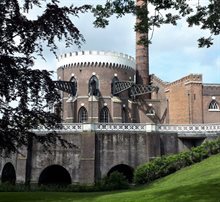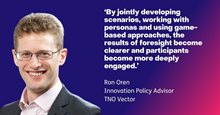Broad approach
‘We would like to be the Netherlands Bureau for Economic Policy Analysis (CPB) for the Amsterdam Metropolitan Area’, says Henri de Groot. As professor of Regional Economic Dynamics at the VU, Henri was asked by the municipality of Amsterdam in 2010 to help devise ways to revitalise the city’s economic explorations. ‘I suggested a wider approach. Within this approach, I thought it would be a good idea to bring together a heterogeneous group of researchers from different parties.’
Focus shift from the city to the metropolitan area
The municipality of Amsterdam agreed to this arrangement. Not long after, TNO became involved as one of the creators of the 2011 Economic Explorations. And although work has been conducted in consortia of different compositions over the past 12 years, the VU and TNO have remained the explorations’ ‘stable core’. These two organisations also took the lead in 2011 when they proposed to update and expand the precursor of the current explorations, the Amsterdam Economic Explorations (AEV).
Since then, the focus has been widened from the city of Amsterdam to the Amsterdam Metropolitan Area (MRA). This vast area has more than 2.5 million inhabitants and covers not only the southern part of North Holland but also the western part of Flevoland. A total of thirty municipalities belong to this metropolis.
‘By focusing on the region, we were truly leading the way at the time’, stresses De Groot. ‘And it turned out to be a good choice, because if you only look at the city, you’re bound to miss certain developments. This is clearly visible when looking at issues such as transport and land use planning, for example. Over the years, we’ve grown to realise that the scale level of the Amsterdam Metropolitan Area is the one that “fits” the region.’
Beyond the CBS figures
The decision to give the explorations a regional character did present an immediate challenge, given that the CBS (Statistics Netherlands) doesn’t publish figures at the level of the Amsterdam Metropolitan Area and its sub-regions.
‘This meant we had to go a few steps further than the CBS’, explains Thijmen van Bree. At TNO Vector, Thijmen is a researcher and consultant dealing with economic issues. He has been involved in the explorations since the outset in 2011.
‘There are always topics for which publicly available data at the regional level doesn’t yet exist. In such instances, it’s great to be partnered with the VU, which regularly works with CBS microdata, to gain deeper insight into specific topics, such as the housing market or income distribution. Such collaboration is frequently a matter of combining different types of data. Doing so is always a puzzle. But it’s also a lot of fun – especially when our puzzling generates new insights.’
A story brought to life
A special feature of the Economic Exploration of the Amsterdam Metropolitan Area is how it covers a specific topic each year. And the topic at hand is not just covered numerically; the researchers involved describe the developments in an approachable way. Readers, therefore, are not simply presented with a dry summation of numbers but are told a story that’s brought to life on the page.
And this starts with the cover of the report. The cover always features attractive photos that subtly refer to that year’s perspective. This year, for instance, the front cover features the De Cruquius pumping station. This is one of the three pumping stations that were used to drain the Haarlemmermeer in the mid-19th century, a regional project of international importance that benefited everyone in the area, a clear reference to the theme of ‘wellbeing’ of this year’s publication.
Policymakers’ move
‘Prosperity has multiple dimensions, all of which we try to map in the explorations. Wellbeing has always been an important starting point, but this year, it has received even greater emphasis’, explains De Groot. ‘We outline the situation in different areas. And that’s where our role ends. Once we’ve done that, it’s up to policymakers to determine what they consider important and want to focus on.’
Key points of interest
Looking at the most recent Economic Explorations, many challenges await the Amsterdam Metropolitan Area’s policymakers. The labour market, the housing market, the social domain, the business climate, infrastructure, and sustainability challenges – all issues that require sharp and far-reaching decisions. Within this context, securing future earning power and distributing wealth fairly are key concerns.
‘We face considerable challenges, but there’s no reason for pessimism’
This was also the message of a speech given on 11 July by Femke Halsema, Mayor of Amsterdam and Chair of the Amsterdam Metropolitan Area. In her speech, she substantively addressed the Economic Explorations that had been presented the day before. ‘Economic growth can no longer be the sole engine of progress but must go hand in hand with economic and social progress. The era we live in requires us to broaden our concept of prosperity.’
In her speech, Halsema pointed out that despite the major challenges facing the area, there’s no reason for pessimism, considering its strong economic position and good facilities. However, she also pointed out that it’s sometimes necessary to subordinate one’s own private interests to the common interest.
The Metropolis of Tomorrow
Matters didn’t stop at that speech; the 2023 Economic Explorations of the Amsterdam Metropolitan Area will also form the basis of ‘The Metropolis of Tomorrow’ this autumn. These are workshops that focus on the challenges raised in the explorations, and where residents can contribute ideas about what is specifically needed to achieve the desired wellbeing.
In short, the ‘2023 Economic Explorations for the Amsterdam Metropolitan Area (in Dutch)’ (Economische Verkenningen Metropoolregio Amsterdam or EVMRA) report, which De Groot and Van Bree so enthusiastically worked on and co-authored with their colleagues at SEO Economic Research, has not disappeared into a drawer somewhere, but is currently the starting point for lively discussions that may well develop into promising initiatives.



